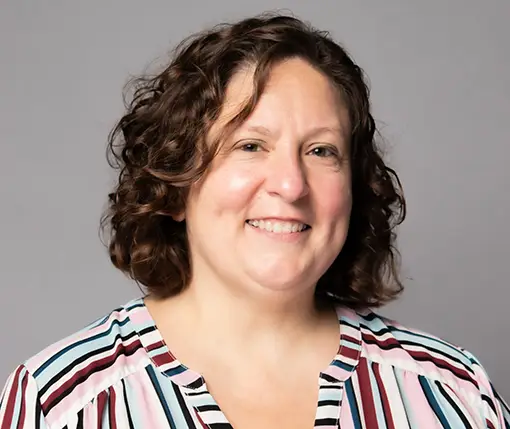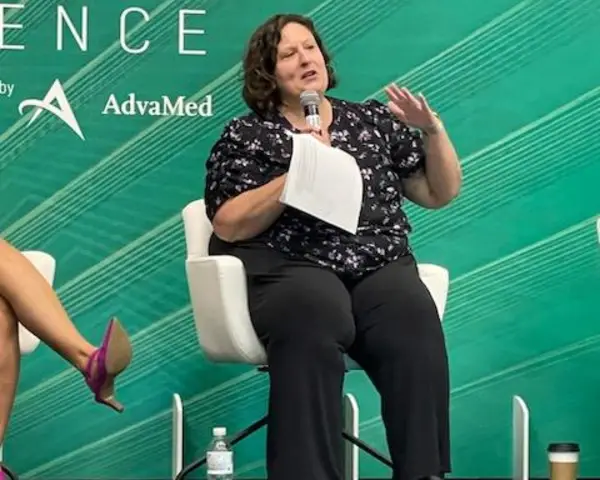Pioneering Sustainability in the Commercial Sector
Jamie Pero Parker helps companies create sustainable products and practices through circularity.
Jamie Pero Parker helps companies create sustainable products and practices through circularity.

In her daily work as a sustainability expert at RTI, Jamie Pero Parker helps clients identify and implement circular economy interventions and replace environmentally harmful materials with safer alternatives.
It’s something she’s been doing since junior high school. As a youngster in rural Utah, Jamie became concerned of the environmental harms of Styrofoam, which was used every day in her school cafeteria.
Jamie, the founder of a student club called the Environmental Protection Society, wanted to cut back on this source of Styrofoam waste. So she and her fellow club members circulated a petition to remove Styrofoam from the cafeteria. To Jamie’s surprise, the school administrators agreed.
“Looking back, it’s surprising now that people listened to us,” Jamie said.
After receiving her PhD in analytical chemistry from the University of North Carolina at Chapel Hill, Jamie worked at the Clorox Company as a scientist. During her first assignment, she helped launch a new product. This experience opened her eyes to the struggles that the commercial industry faces when testing and launching new products. She realized that she wanted a career that was mission driven where she could help solve industry issues and create sustainable practices.
“I knew I wanted to work on stuff that had an impact,” she said. “Now that I am a mother, I view the world through my daughter’s eyes. I want her to know that my work is focused on improving the world that she and children around the world live in. I want to make a difference. In my group at RTI our clients are predominantly commercial, and so understanding the problems they face has helped me as I try to solve sustainability challenges within those companies.”
After two years with Clorox, Jamie joined RTI at a time when the commercial market wasn’t ready sustainable practices. Jamie recalled that initially products focused on being more sustainable often were not successful in the market because they were generally more expensive.
“For example, we would do projects with a client on how to make environmentally friendly antimicrobials, wipes, cosmetics, or air fresheners, and the projects would get done and be put on the shelf,” Jamie stated. “It wouldn’t go anywhere because the market signals weren’t strong enough. You can’t change consumer behavior if just one brand is doing it. It has to be a concerted effort where everybody is doing it together to help bring about the necessary behavior change.”
In the last five years there has been a shift in public perception around sustainability. “It’s interesting – there’s some studies that are showing consumers care more about mismanaged plastic waste in the environment than climate change because they can see plastic pollution, and they know it’s going to impact their health.”

Jamie has worked with medical device companies to address recycling opportunities for single-use plastics in the medical field, including syringes, disposable covers, IV bags, and face masks.
Jamie mentioned some of her commercial work identified chemicals of concern before it was mainstream knowledge.
In 2017, her team helped a commercial client find omniphobic coatings, which are coatings that repel grease, stains, and water. During this search, the question of using perfluorinated compounds (PFAS) came up. PFAS have recently received negative attention for their link to various health problems, including reproductive issues, cancers, and liver damage. They’ve earned the name “forever chemicals” because they do not break down easily in nature and have been found in drinking water and in the blood of over 97% of Americans. However, at the time little was known about the extensive harm of PFAS, and the client’s scientists deemed PFAS safe. Jamie’s team offered to do a literature review and found evidence that PFAS chemistries were not safe, and the company should avoid them.
“I still remember sitting in that meeting with a client, and them saying ‘is this [PFAS] really in all of our blood’ and telling them it’s appearing ubiquitously in blood samples,” Jamie recalled. “That was a watershed moment in my career. Our client realized through that one project that they needed to remove PFAS across their portfolio. They came back to us with more work to find alternatives. It was one of the first moments that I realized my voice and my scientific training can make a difference and help the world.”
Jamie and her team are on the frontline of enabling the transition to a circular economy. This includes working with companies, consortiums, foundations, and governments to identify more sustainable packaging and ingredients, to modeling the impact of interventions and to understanding the effects of policy.
Jamie also collaborates across the institute on ensuring companies have an accurate understanding of the impact of microplastics and how to design away from their production. Microplastics are tiny particles of plastic less than 5 millimeters in size. They have received widespread attention in recent years because of their significant presence in the environment. Studies in 2024 indicated that microplastics have breached the blood-brain barrier, meaning plastic has been found in human brain tissue.
Jamie continues to study emerging trends to create a more sustainable future. "I think plasticizers are going to be getting a lot more attention and in particular phthalates are known to have impacts on human fertility,” she said. “I don’t think most people realize that every day as they select products, they are making choices that impact their health.”
While a lot is still unknown about chemicals of concern in our environment, Jamie is optimistic that scientists, manufacturers, and the public can come together to solve these issues and improve sustainability in the commercial sector and beyond, creating a more sustainable future.
We have to forge a path forward as the next generation of innovators, with an understanding that material choices not only affect our species, but the planet and other species as well. We are called upon to address the unintended mistakes of past innovation and drive towards innovation that safeguards the future. I take that responsibility incredibly seriously, and I believe innovation can be a force for good.